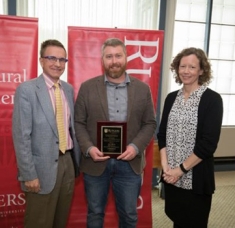
Jeff Boyd, the 2019 recipient of the SEBS Research Excellence Award, has established himself as an expert in microbial biochemistry and physiology. At Rutgers he has developed a vibrant research program at the interface between chemistry and biology, that focuses on understanding how critical cellular components of pathogenic bacteria coordinate to produce a living organism with a robust and responsive metabolism, i.e. his works decipher how they function. Currently, his research focuses on two opportunistic pathogens and leading causes of nosocomial infections: the Gram-positive bacterium, Staphylococcus aureus and the Gram-negative bacterium, Salmonella enterica. In addition, he is using Bacillus subtilis as a model. He is interested in how they process intracellular metals: how metals kill microorganisms, how microorganisms detoxify them, and how microorganisms use them for efficient metabolism. Jeff's scholarship takes advantage of his expertise in biochemistry, physiology, and molecular genetics and is providing seminal contributions to our understanding of how bacteria use metals in metabolism and how they synthesize metal cofactors, processes that are essential for life on Earth. His scholarship addresses key questions relevant to medicine, microbial pathogenesis, and biotechnology and has attracted international attention. Boyd's work is supported by the Johnson and Johnson Foundation, the Cystic Fibrosis Foundation and two major grants from the National Institute of Allergy and Infectious Diseases (NIH) and the National Science Foundation. His scholarship is recognized by a prestigious NSF Career Award in support of early-career faculty who have the potential to serve as academic role models in research and education and to lead advances in the mission of their department or organization. Indeed, he is indeed a rising star in the field of microbial biochemistry.
See all Excellence Award recipients at the SEBS/NJAES Newsroom